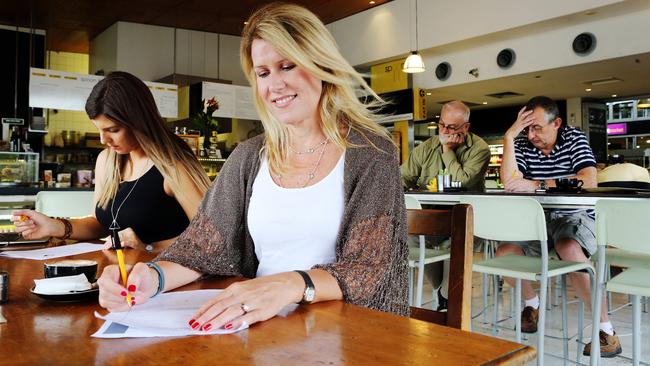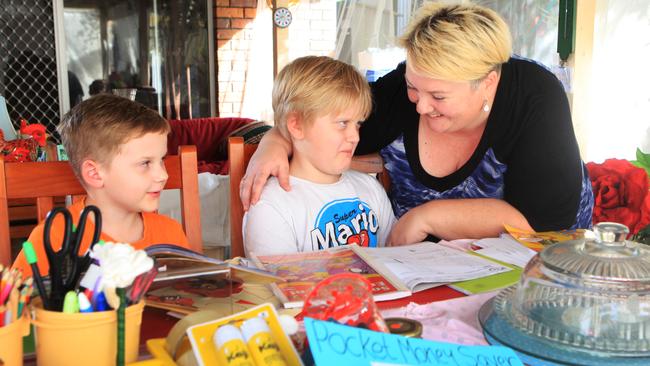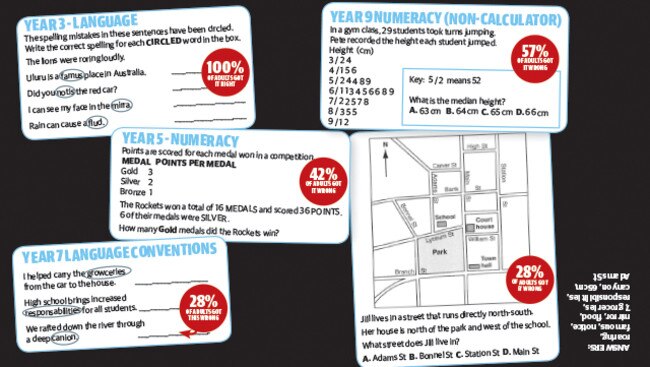Home schooling takes off in Queensland amid NAPLAN stress, bullying fears
NAPLAN stress and bullying concerns have led to a surge in home schooling in Queensland. But do you have what it takes to teach? Take the test

NAPLAN, bullying and simply struggling to fit in are some of the reasons why home-school registrations have swollen by 234 per cent in the past seven years.
And experts believe close to 85 per cent of children being taught at home are not registered with the Department of Education.
NAPLAN: Spike in home tutoring
THREE Rs: Rote learning makes comeback
“There is a changing attitude to home schooling. More Queenslanders realise there may be something in it,” said Terry Harding, manager of Australian Christian Home Schooling.
He estimates that there are more than 10,000 homeschoolers in the state and rising.
“The stresses of tests like NAPLAN may have stimulated renewed interest. Bullying is also a key factor, but in my experience parents simply want their children to achieve the highest level of literacy and numeracy, they want to instil their values in the children and there is the issue of social awareness,’’ Dr Harding.
“Research shows it is a myth to think that children can only learn social skills in the school setting. It is the local community where children learn these skills.
“While the number of registrations seem small, I would estimate there are about 85 per cent of children not registered. Then, of course, there are the children who learn at home through distance education which is a different set of numbers.”
In 2013 there were 1108 registrations in Queensland.
Brisbane mum-of-two Sarah Wheatley is new to home schooling. She opted to pull her son out of his school this year when she felt he “was struggling socially and emotionally”.
“I am just a mum with no real experience, but I am enjoying teaching my two children, six-year-old Reubyn and eight-year-old Gruffyn, numeracy and literacy, but more importantly life skills in a casual setting. I am registered and the department monitors progress,” she said.
Ms Wheatley does not support NAPLAN testing.
Eight years ago when Queensland veterinarian Audrey Harvey decided to home school her children she said people thought she was weird.
“Times have changed. Today people are genuinely interested and supportive,” she said. Her children are now 12 and 14.
“My daughter had only five weeks of mainstream schooling in Year 1 and since then I’ve been teaching them at home. In just those few weeks I felt that her needs would not be met. Both kids are thriving and are highly active in social activities, they go on scout camps and are very well adjusted. It may not work for everyone, but it works for us. We do not participate in NAPLAN but I test the kids myself,” Dr Harvey said.
Parents of school-aged children are required by law to enrol their child in a state or non-state school and ensure that they attend the school. The requirement does not apply to a child who is provisionally registered or registered for home education.
The department “neither encourages nor discourages home education”.

ONLY 30% OF ADULTS PASS THE TEST
THIS week The Courier-Mail asked a group of adults to answer past questions from the national literacy and numeracy tests, which examine Years 3, 5, 7 and 9 students in reading, writing, spelling, grammar, punctuation and numeracy.
Less than one-third of the adults answered all of the questions correctly, with Year 9 numeracy proving the toughest.
English Teachers Association of Queensland president Fiona Laing said she was not surprised, as the tests were hard in an attempt to gauge the full range of student capability.
“There’s many adults that would get many of those wrong,” Ms Laing said.
She said NAPLAN had played a part in spelling, grammar and punctuation being taught more specifically in Queensland classrooms than in the 1970s and 1980s.
Queensland Teachers’ Union president Kevin Bates said current schoolchildren were tested more than any other generation and like Ms Laing, raised concerns about pressure on teachers and students sparked by NAPLAN and curriculum being narrowed as a result of the tests.
Griffith University Arts, Education and Law Group Dean of Learning and Teaching Professor Glenn Finger said schoolchildren now were learning a higher standard of mathematics than decades ago.
Brand specialist Sonya Vanjicki, 28, who answered NAPLAN sample questions for The Courier-Mail, said some answers could prove tough for anyone who had left school because they were no longer using the skills on a day-to-day basis, but the tests seemed age-appropriate for students at school.

DAY IN LIFE OF HOME-SCHOOLED KIDS
7am: Rise and shine. Boys taught to get own breakfast
8am: No school run for us. Act of kindness time where boys feed chickens, collect eggs, clean kitty litter and emply dishwasher for no rewards
9am: Australian National Curriculum aligned maths and english
10.30am: Morning tea and play in treehouse, check seedlings and rain guage
11am: Reading of books borrowed from library. When weather cold we snuggle on sofa when fine we learn outside
11.30am: Project time. Research on themes like Anzacs, pirates or environment or attend home educators’ workshops
12.30pm: Lunch time
1.30pm: Swimming, park play, library visit or visiting with friends
3pm: Again no school run for us. Free time
4.30pm: Dinner preparation. Acts of kindness where boys feed cats and clean up
5.30pm: Dinner time including clearing the table when finished
6pm: Self-defence class, youth club, TV time
7.30pm: Phone daddy to say goodnight and then bed





